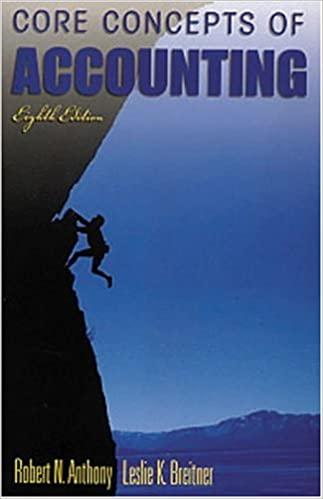Question
Suppose a bank has 100 million dollars of assets to invest. It can either invest in risky or safe loans. Safe loans will be worth
Suppose a bank has 100 million dollars of assets to invest. It can either invest in risky or safe loans. Safe loans will be worth $105 M in one year with certainty. Risky loans will be worth either $70 M or $130 M in one year, each with equal probability.
A) Suppose the bank has $80 million in one-year time deposits. For simplicity, assume that they pay no interest, so that the bank's liability will still be $80 M in one year. Assume that the deposits are insured by the government, and for simplicity assume that the bank does not have to pay a premium for this insurance. If the bank's assets are worth less than $80 M in one year, the government will shut the bank down and pay the difference between $80 million and the value of assets. [HINT: SET UP THE BANKS BALANCE SHEET]
1. a) Compute the probability that the bank will fail, b) the expected value of the bank's net worth and c) the expected size of the government's bailout in one year if the bank invests its assets in safe loans.
2. Do the same assuming the bank invests in risky loans.
3. Which investment strategy would the government prefer the bank to undertake? Which strategy will the bank choose, assuming that the bank's primary objective is to ensure its survival, and its secondary objective is to maximize its expected net worth.
B) Now suppose the bank has $110 M of deposits, so that it is actually insolvent.[AGAIN: SET UP THE BANKS BALANCE SHEET] However, for some reason regulators fail to shut the bank down promptly and give the bank one year to recover.
a. Compute the probability that the bank will fail, the expected value of the bank's net worth and the expected size of the government's bailout in one year, under each of the two investment strategies.
b. Which strategy will the government prefer? Which strategy will the bank undertake?
c. Given the strategy the bank will choose, would the government be better off (in terms of expected bailout) closing the bank now, instead of giving it a year to recover?
d. Suppose there was no deposit insurance, and suppose that depositors are able to observe what kind of loans the bank makes. How might this change the outcome? Would the bank still be able to choose the risky strategy?
I ONLY NEED PART B
Step by Step Solution
There are 3 Steps involved in it
Step: 1

Get Instant Access to Expert-Tailored Solutions
See step-by-step solutions with expert insights and AI powered tools for academic success
Step: 2

Step: 3

Ace Your Homework with AI
Get the answers you need in no time with our AI-driven, step-by-step assistance
Get Started


